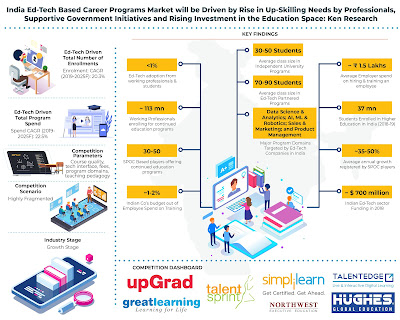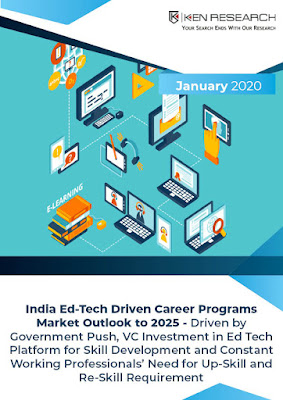Up-Skilling and Re-Skilling in order to stay in touch with the rapidly evolving technological trends is now a standard requirement in India’s professional landscape. Professionals turn towards online learning as a means to achieve the goal, due to their inability to turn back to conventional classroom modes of learning. In conversation with Mr. Diwakar Chittora, Founder and CEO at Intellipaat, we attempt to track the company’s growth journey from a running a Big Data and Hadoop Training for 12 people in 2011, to being profitable and growing 100% YoY, despite being bootstrapped.
Q1. Intellipaat today is one of the leading providers of tech and emerging tech-focused courses. What was the driving force behind starting the company?
In 2011, I was heading to the BI department at WIPRO. At that time, Big Data & Hadoop were extremely buzzing technologies and I wanted to skill myself in those. I didn’t find any suitable companies in India offering this training. Moreover, the waiting time was around 3 months and the cost was Rs. 1.25 lakhs. Flying abroad for the course was also out of the question as the cost was too high. Me And my wife (Co-Founder) approached freelancers on LinkedIn wherein we found a trainer in the US charging Rs. 2 lakhs for the training. Then we gathered around 12 other people for the training & charged around Rs.20,000 per person, as a result I learned the program free of cost. Then after some time, Ericsson approached us and over a period of 5 months, we trained around 300 Ericsson employees in Big Data & Hadoop. We understood that this problem statement also exists across corporate who wish to train their employees in these technologies.
 |
| Mr. Diwakar Chittora, Founder and CEO at Intellipaat |
Q2. How has the company achieved scalability in the Indian market since its start in 2011?
We have been completely bootstrapped & have been growing almost like 100% YoY. We have also been profitable in the market and must be the only one in the market to be profitable, growing at 100%, and being completely bootstrapped in nature.
Q3. How big a learner base does Intellipaat have currently? Which target audience segment is dominating its learner profile?
We have 600,000+ learners across 53 countries and have a team of 230 full-time employees. Learners from India form around 45% of our total learner base. We only train professionals having a minimum of 1-year experience and up-to the CXO level. We focus majorly on learners having 1 to up to 8 years of experience. Most of our audience would be in this segment. Another set would be 8 and above years, where project managers and CXO level people come in.
Q4. In a massively fragmented industry for re-skilling and up-skilling programs in the country, how does Intellipaat differentiate itself from players such as upGrad, Simplilearn, Coursera, Udacity, Great Learning and others?
At Intellipaat, we focus a lot on the achievement of Learning Outcomes, whether it be entering a new work field, switch to a high-paying job, advance at their organization or take up a new project at their company. At the end of the day, Intellipaat unlike other companies believes more in helping learners achieve their targets and increasing the career transition rate of their learner base. When we design the course, we make sure that the person who completes the course is equivalent to a professional already having 6 months of experience in the industry and working on similar skills.
Q5. Which is the largest course segment for the platform in India? What is the size and performance of the company’s tech and emerging-tech course portfolio?
All courses on technologies like Data Science, AI, Big Data, and Cloud are driving the top-line for us. All the emerging technologies that we deal in are pretty good in driving our revenue.
Q6. A prominent bottleneck encountered by online skilling platforms is the low completion rates of programs. How is the company endeavouring towards bucking the trend of low course completion rate?
It all depends on the mode of delivery. If we talk about asynchronous learning or self-paced learning, the completion rate is bound to be low. If we talk about Instructor-Led training, automatically the interactivity rises and instructor support is available. We have dedicated instructors; we know the pedagogy of the course and we understand what material is to be delivered on various stages of the course cycle. We have a 75-80% completion rate across all of our courses. People who drop out of this metric are the people who miss first few classes of a course, and then join the next batch of the program instead of learning from pre-recorded video lectures.
Q7. What is the company’s monetization model like?
We create the courses ourselves and own the content. We go and achieve the enrolment, we have the trainers who are paid by us, and then we earn money basis course fees. We also have programs in partnership with organizations such as IBM, Microsoft and Automation Anywhere. The trainers that we have for programs are our subject-matter experts who have a minimum of 8 years of industry experience.
Q8. What are the program delivery modes that the company offers to its learners? What is the price segment that the company operates in?
We deliver training 100% online as we want to provide training to an audience around the globe. We have both Self-Paced courses & Instructor-Led Programs. Each session is recorded and is available to the learners post the completion of the module. We have a 24/7 dedicated support team providing generic as well as program-specific support to students. We have courses that are in an affordable price segment.
Q9. The adoption of online skilling programs and courses is growing in India, with professionals and students upgrading their skills to stay relevant. According to you how has the growth in the overall industry been?
The transition from University-based learning to Online learning took some time as we were used to classroom-based learning. Nowadays people have become habitual and used to Online Learning.
Now people realize that Online Learning eliminates time and travel constraints and allows professionals to study at their own time. Now a student from Bihar can learn a program from an instructor sitting in the US, that’s the beauty of Online Learning.
Q10. Which business segment is Intellipaat more focused on? How does the B2B (Corporate Training) segment of the company compare with other segments?
Being a bootstrapped company, we focus more on B2C as the money comes upfront. In B2B, its more about long payment cycles which usually comes post the training. We have to pay trainers upfront or within a certain time-frame. We have 200+ corporate clients across the globe. Recently we have trained almost 400 employees in NASDAQ US in Data Science & around 300 people in Society General in last 3 months on DevOps and Cloud Tech.
Q11. Does Intellipaat partner with Universities and Academic Institutions to offer co-branded & co-developed courses?
We do collaborate with top universities. We have very recently tied up with E & ICT Academy at IIT Guwahati, offering 3 PG certifications in Big Data Analytics, Cloud & DevOps and Full Stack Web Development. The objective here is to provide the Academic Rigours along with the industry expertise to professional and increase employability across hot in-demand technologies. As part of our CSR Initiative during the Covid-19 lockdown, we have launched Intellipaat Academy, which focuses on Foundational tech courses for early engineers and early professionals, offered free of cost. The focus here is on enabling learners to get an initial level understanding of technologies free of cost.
Q12. What future trends are you expecting to encounter in the vastly changing online skilling industry? How do the company’s future expansion plans shape up?
The outcome of the Covid-19 outbreak has been that organizations & universities are now more used to and equipped to operate or learn online. Sensitivity and adoption towards online programs will definitely go up in the coming 5-6 months. Talking about Intellipaat, we’ll be launching courses wherein we have partnered with Universities for our professional audience. Talking about the college segment, it would be an interesting segment to work on in the future. We will also be looking to expand our course categories to incorporate more emerging and in-demand technologies. We will try to achieve 150-200% growth in the next 3 years YoY.
Q13. Does the company plan on raising funds in the future, or is remaining bootstrapped part of its long-term outlook?
As of now we see that we are self-sufficient in the industry, but if we see that there is a need for funds for growth expansion, we’ll take a call there.
For feedback and queries, reach out to the Ken Research Team at ankur@kenresearch.com
To Know More Information on the publication: -
Contact Us: -
Ken Research
Ankur Gupta, Head Marketing & Communications
Ankur@kenresearch.com
+91-9015378249
Ken Research
Ankur Gupta, Head Marketing & Communications
Ankur@kenresearch.com
+91-9015378249



